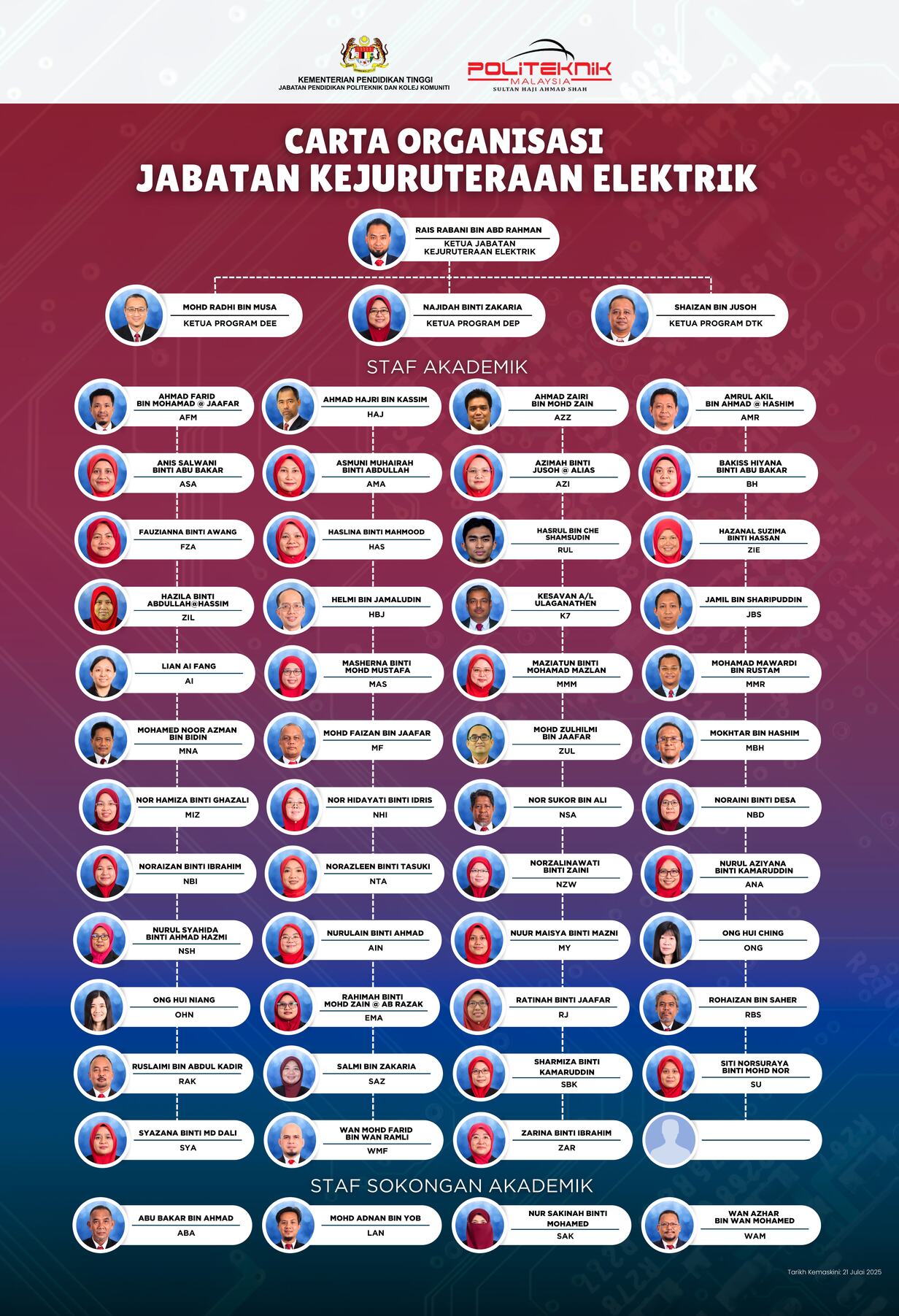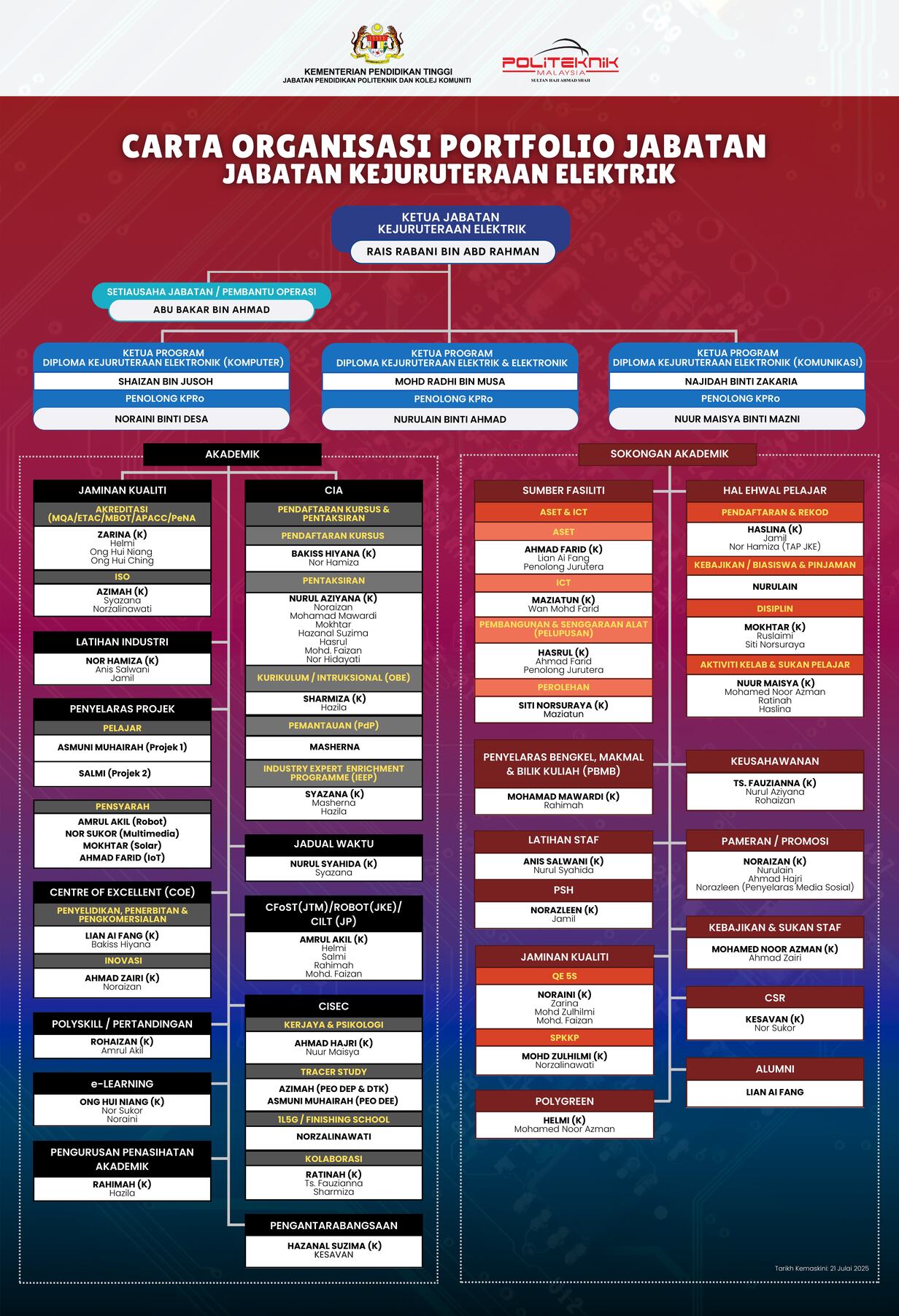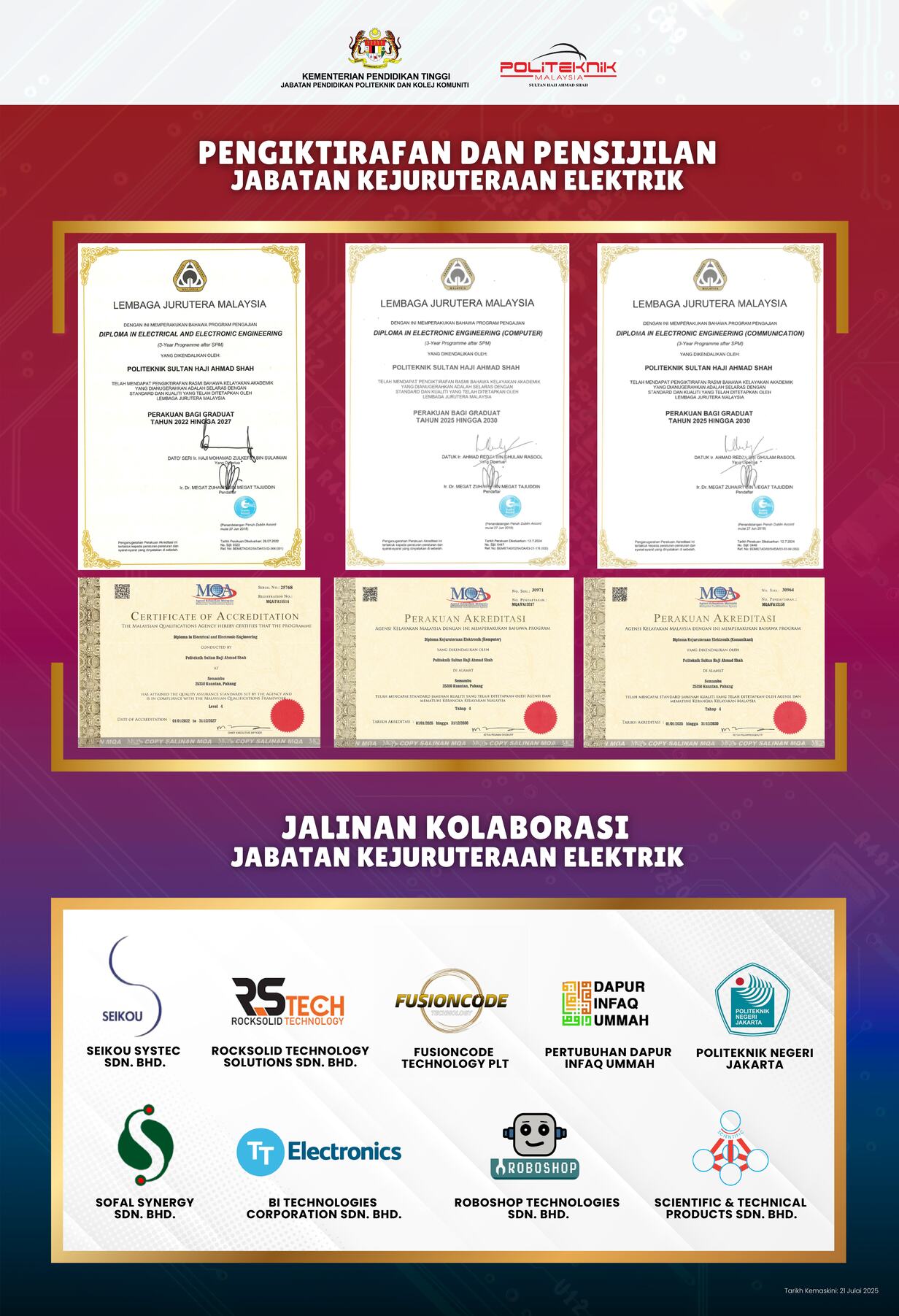Jabatan Kejuruteraan Elektrik
- Details
- Hits: 1702
Pengenalan
Pengenalan JKE
Bidang kejuruteraan Elektrik merupakan satu bidang kejuruteraan teknologi yang sedang berkembang pesat di Malaysia. Bidang ini menggabungkan pengetahuan tentang sains dan teknologi meliputi kajian tentang teknologi elektrik, sistem elektronik, sistem berdigit, baikpulih alatan elektronik dan juga reka bentuk terbantu komputer.
Bermula sejak Mei 2002, Jabatan Kejuruteraan Elektrik di Polisas menawarkan program Sijil Kejuruteraan Elektrik dan Elektronik, Diploma Kejuruteraan Elektik dan Elektronik dan Bridging Teknologi Komputer (BTK) serta turut mengekalkan kursus sedia ada iaitu Diploma Kejuruteraan Elektronik Komputer. Pelajar-pelajar di dalam setiap kursus ini akan didedahkan dengan pengetahuan dan kemahiran untuk menguji peranti elektrik dan elektronik bagi penambahbaikan perisian komputer. Kurikulum kursus ini mengandungi modul sistem digital, pengukuran dan pengalatan elektronik, sistem pemprosesan mikro, jurubina komputer, kajian dan pengelenggaraan komputer serta kejuruteraan perisian.Bagi pelajar Diploma Kejuruteraan Elekrik dan Elektronik, mereka akan didedahkan dengan kemahiran dan pengetahuan menguji dan memperbaiki serta menentukan pengalatan elektronik. Kursus ini mengandungi modul asas elektrik dan elektronik, pepasangan dan pendawaian, sistem digital, litar elektronik, telekomunikasi, pengalatan dan kawalan. Selain daripada itu juga, kursus ini akan mendedahkan pelajar kepada bidang kejuruteraan elektronik yang menjuruskan kepada sistem kawalan elektronik di industri. Selain dari modul asas dalam bidang elektrik dan elektronik, pelajar akan mempelajari elektronik industri, sistem kawalan, sistem mikro-komputer, CAD, Sistem automatik dan kawalan motor elektrik. Kursus ini diperkenalkan berikutan permintaan dan pembangunan yang pesat di dalam bidang ini sama ada di bidang industri atau pembuatan
Program
Programme
INTRODUCTION
Department of Electrical Engineering, Politeknik Sultan Haji Ahmad Shah (POLISAS) currently offers three academic programmes;
- Diploma in Electronic Engineering (Communication)- DEP
- Diploma in Electronic Engineering (Computer) - DTK
- Diploma in Electrical & Electronic -DEE .
Diploma In Electronic Engineering (Communication) / DEP : MQA/FA13158
Diploma Kejuruteraan Elektronik (Komunikasi)
is a branch of electronic engineering with specialization in communication technology. In addition to basic electrical and electronic courses, basic computer and programming courses and math courses, specialized courses offered are telephony, optical fiber communications, data communications, wireless communications and microwave devices.
Diploma In Electronic Engineering (Computer) / DTK : MQA/FA13217
Diploma Kejuruteraan Elektronik (Komputer)
designed to cover electronic engineering disciplines with the addition of electronic computer technology specialization. Electronic basics include telecommunications, power, control, instrumentation, and computers.
Diploma In Electrical & Electronic / DEE : MQA/FA5080
Diploma Kejuruteraan Elektrik & Elektronik
covers power and control of electrical, electronic, telecommunications and computer systems. While electronic engineering is another engineering branch that discusses practical applications for designing, fabrication and operation of electronic circuits, electronic devices, broadcasting and communications systems, biomedical equipment and medical imaging operating on low voltage sources as part of driving force.
ENTRY REQUIREMENT
The general minimum requirement for student entry:
I. Citizen of Malaysia
ii. Passed Sijil Pelajaran Malaysia (SPM) or equivalent with the minimum of :-
- Passed Bahasa Melayu
- Passed Bahasa Inggeris
- Passed Sejarah
- At least credit in THREE (3) subjects including:-
: Mathematics or Additional Mathematics
: ONE (1) relevant science / technical / vocational subject
: ONE (1) other subjecti
iii. No color blindness
v. No physical disability that may disturb practical work activities.
JOB PROSPECTS
DEP
This programme provides the knowledge and skills in communication engineering that can be applied to a broad range of careers in most electronic communication field. The knowledge and skills that the students acquire from the programme will enable them to participate in the job market as:-
>> Assistant Engineer / Technical Executive
>> Sales Executive
>> Supervisor
>> Assistant Radio Frequency (RF) Engineer
>> Assistant Electronic Engineer
>> Assistant Technical Designer
>> Self-employed in related field
>> Entrepreneur
>> Assistant Networking Engineer
>> Assistant Network Administrator
DTK
This programme provides the knowledge and skills in electronic engineering with specialization in computer. The knowledge and skills that the students acquire from the programme will enable them to participate in the job market as:-
>> Computer Technician
>> Electronic Technician
>> Technical Specialist
>> Electrical, Electronic and Computer Service Technician
>> Assistant Engineer
>> Marketing Executive
>> Self-employed
DEE
This programme provides the knowledge and skills in electrical engineering that can be applied to a broad range of careers in most power generation provider and manufacturing industries. The knowledge and skills that the students acquire from the programme will enable them to participate in the job market as:-
>> Electrical/Electronic Technician
>> Electrical Engineering Service Advisor
>> Technical Assistant
>> Electrical/Electronic Engineering Supervisor
>> Assistant Engineer
PROGRAMME OVERVIEW
1.0 DIPLOMA IN ELECTRONIC ENGINEERING (COMMUNICATION) / DEP
1.1 Programme Aim
The Diploma in Electronic Engineering (Communication) graduates in Polytechnics, Ministry of Higher Education will have the knowledge, technical skills, communication skills and attitude to adapt themselves with new technological advancement and challenges in the electronics communication field.
1.2 Programme Educational Objectives (PEO)
The Diploma in Electronic Engineering (Communication) programme shall produce semiprofessionals that are:
|
PEO1 |
Practicing technician in electrical engineering related field |
|
PEO2 |
Contributing to society with professional ethic and responsibilities |
|
PEO3 |
Engaging in enterprising activities that apply engineering knowledge and technical skills |
|
PEO4 |
engaging in activities to enhance knowledge for successful career advancement |
1.3 Programme Learning Outcomes (PLO)
PLO1: Knowledge: Apply knowledge of applied mathematics, applied science, engineering fundamentals and an engineering specialisation as specified in DK1 to DK4 respectively to wide practical procedures and practices;
PLO2: Problem analysis: Identify and analyse well-defined engineering problems reaching substantiated conclusions using codified methods of analysis specific to their field of activity (DK1 to DK4);
PLO3: Design/development of solutions: Design solutions for well-defined technical problems and assist with the design of systems, components or processes to meet specified needs with appropriate consideration for public health and safety, cultural, societal, and environmental considerations (DK5);
PLO4: Investigation: Conduct investigations of well-defined problems; locate and search relevant codes and catalogues, conduct standard tests and measurements;
PLO5: Modern Tool Usage: Apply appropriate techniques, resources, and modern engineering and IT tools to well-defined engineering problems, with an awareness of the limitations (DK6);
PLO6: The Engineer and Society: Demonstrate knowledge of the societal, health, safety, legal and cultural issues and the consequent responsibilities relevant to engineering technician practice and solutions to well-defined engineering problems (DK7);
PLO7: Environment and Sustainability: Understand and evaluate the sustainability and impact of engineering technician work in the solution of well-defined engineering problems in societal and environmental contexts (DK7);
PLO8: Ethics: Understand and commit to professional ethics and responsibilities and norms of technician practice; (DK7)
PLO9: Individual and Team Work: Function effectively as an individual, and as a member in diverse technical teams;
PLO10: Communications: Communicate effectively on well-defined engineering activities with the engineering community and with society at large, by being able to comprehend the work of others, document their own work, and give and receive clear instructions;
PLO11: Project Management and Finance: Demonstrate knowledge and understanding of engineering management principles and apply these to one’s own work, as a member or leader in a technical team and to manage projects in multidisciplinary environments;
PLO12: Life Long Learning: Recognise the need for, and have the ability to engage in independent updating in the context of specialised technical knowledge;
2.0 DIPLOMA IN ELECTRONIC ENGINEERING (COMPUTER) / DTK
2.1 Programme Aim
The Diploma in Electronic Engineering (Computer) graduates in Polytechnics, Ministry of Higher Education will have the knowledge, technical skills, communication skills and attitude to adapt themselves with new technological advancement and challenges in the computer and electronics field.
2.2 Programme Educational Objectives (PEO)
Diploma in Electronics Engineering (Computer) programme shall produce semiprofessionals who are:
|
PEO1 |
Practicing technician in electrical engineering related field |
|
PEO2 |
Contributing to society with professional ethic and responsibilities |
|
PEO3 |
Engaging in enterprising activities that apply engineering knowledge and technical skills |
|
PEO4 |
engaging in activities to enhance knowledge for successful career advancement |
2.3 Programme Learning Outcomes (PLO)
Upon completion of the programme, graduates should be able to:
PLO1: Knowledge: Apply knowledge of applied mathematics, applied science, engineering fundamentals and an engineering specialisation as specified in DK1 to DK4 respectively to wide practical procedures and practices;
PLO2: Problem analysis: Identify and analyse well-defined engineering problems reaching substantiated conclusions using codified methods of analysis specific to their field of activity (DK1 to DK4);
PLO3: Design/development of solutions: Design solutions for well-defined technical problems and assist with the design of systems, components or processes to meet specified needs with appropriate consideration for public health and safety, cultural, societal, and environmental considerations (DK5);
PLO4: Investigation: Conduct investigations of well-defined problems; locate and search relevant codes and catalogues, conduct standard tests and measurements;
PLO5: Modern Tool Usage: Apply appropriate techniques, resources, and modern engineering and IT tools to well-defined engineering problems, with an awareness of the limitations (DK6);
PLO6: The Engineer and Society: Demonstrate knowledge of the societal, health, safety, legal and cultural issues and the consequent responsibilities relevant to engineering technician practice and solutions to well-defined engineering problems (DK7);
PLO7: Environment and Sustainability: Understand and evaluate the sustainability and impact of engineering technician work in the solution of well-defined engineering problems in societal and environmental contexts (DK7);
PLO8: Ethics: Understand and commit to professional ethics and responsibilities and norms of technician practice; (DK7)
PLO9: Individual and Team Work: Function effectively as an individual, and as a member in diverse technical teams;
PLO10: Communications: Communicate effectively on well-defined engineering activities with the engineering community and with society at large, by being able to comprehend the work of others, document their own work, and give and receive clear instructions;
PLO11: Project Management and Finance: Demonstrate knowledge and understanding of engineering management principles and apply these to one’s own work, as a member or leader in a technical team and to manage projects in multidisciplinary environments;
PLO12: Life Long Learning: Recognise the need for, and have the ability to engage in independent updating in the context of specialised technical knowledge;
3.0 DIPLOMA IN ELECTRICAL & ELECTRONIC / DEE
3.1 Programme Aim
The Diploma in Electrical and Electronic Engineering graduates in Polytechnics, Ministry of Higher Education will have the knowledge, technical skills, communication skills and attitude to adapt themselves with new technological advancement and challenges in electrical and electronics field.
3.2 Programme Educational Objectives (PEO)
The Diploma in Electrical and Electronics Engineering programme shall produce semiprofessionals who are:
|
PEO1 |
Practicing technician in electrical engineering related field |
|
PEO2 |
Contributing to society with professional ethic and responsibilities |
|
PEO3 |
Engaging in enterprising activities that apply engineering knowledge and technical skills |
|
PEO4 |
engaging in activities to enhance knowledge for successful career advancement |
3.3 Programme Learning Outcomes (PLO)
Upon completion of the programme, graduates should be able to:
PLO1: Knowledge: Apply knowledge of applied mathematics, applied science, engineering fundamentals and an engineering specialisation as specified in DK1 to DK4 respectively to wide practical procedures and practices;
PLO2: Problem analysis: Identify and analyse well-defined engineering problems reaching substantiated conclusions using codified methods of analysis specific to their field of activity (DK1 to DK4);
PLO3: Design/development of solutions: Design solutions for well-defined technical problems and assist with the design of systems, components or processes to meet specified needs with appropriate consideration for public health and safety, cultural, societal, and environmental considerations (DK5);
PLO4: Investigation: Conduct investigations of well-defined problems; locate and search relevant codes and catalogues, conduct standard tests and measurements;
PLO5: Modern Tool Usage: Apply appropriate techniques, resources, and modern engineering and IT tools to well-defined engineering problems, with an awareness of the limitations (DK6);
PLO6: The Engineer and Society: Demonstrate knowledge of the societal, health, safety, legal and cultural issues and the consequent responsibilities relevant to engineering technician practice and solutions to well-defined engineering problems (DK7);
PLO7: Environment and Sustainability: Understand and evaluate the sustainability and impact of engineering technician work in the solution of well-defined engineering problems in societal and environmental contexts (DK7);
PLO8: Ethics: Understand and commit to professional ethics and responsibilities and norms of technician practice; (DK7)
PLO9: Individual and Team Work: Function effectively as an individual, and as a member in diverse technical teams;
PLO10: Communications: Communicate effectively on well-defined engineering activities with the engineering community and with society at large, by being able to comprehend the work of others, document their own work, and give and receive clear instructions;
PLO11: Project Management and Finance: Demonstrate knowledge and understanding of engineering management principles and apply these to one’s own work, as a member or leader in a technical team and to manage projects in multidisciplinary environments;
PLO12: Life Long Learning: Recognise the need for, and have the ability to engage in independent updating in the context of specialised technical knowledge;
Kemudahan
Kemudahan di JKE
Jabatan Kejuruteraan Elektrik diperuntukkan 2 buah dewan kuliah dan 15 buah bilik kuliah untuk pelaksanaan proses pengajaran dan pembelajaran. Lima daripada bilik-bilik kuliah tersebut dilengkapi dengan LCD Projektor dan alat penghawa dingin. Di samping itu, 6 unit LCD projektor mudah alih disediakan untuk kegunaan pensyarah di bilik-bilik kuliah. Walaubagaimanapun , sekiranya perlu, bilik-bilik kuliah dari jabatan lain juga boleh digunakan. Bilik kuliah adalah gunasama antara jabatan di POLISAS. JKE juga menyediakan dua bilik surau untuk staf (lelaki dan perempuan ) dan satu surau untuk pelajar perempuan.
Jabatan Kejuruteraan Elektrik juga dilengkapi dengan 20 buah makmal bagi memenuhi keperluan proses pengajaran dan pembelajaran. Makmal-makmal tersebut adalah:
|
2. Makmal Elektronik Berdigit |
|
|
|
|
|
|
|
|
|
|
|
|
|
|
|
|
|
|



